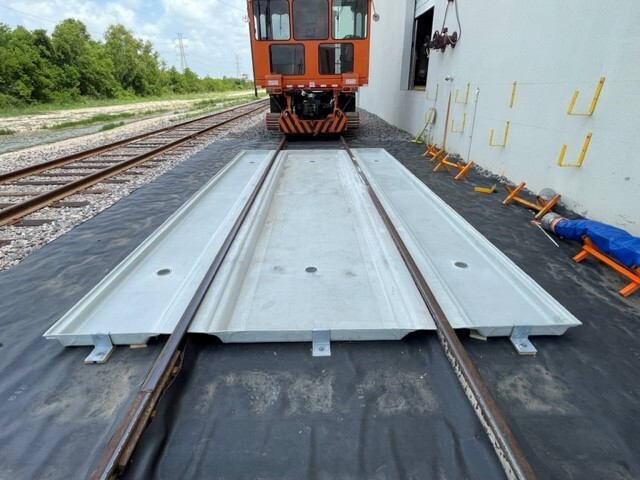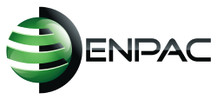Stay on Track with ENPAC Rail Berms
Posted by ENPAC LLC on Nov 3rd 2025
Spills are a risk when transferring liquids or granular materials by rail such as fuel, chemicals, oils, or plastic pellets and may lead to serious safety, environmental and financial consequences. ENPAC rail containment berms are engineered to manage those risks with portable, durable secondary containment to be deployed under rail cars, transfer points, or loading/unloading areas capturing leaks and preventing contamination.
ENPAC rail berms help plastic suppliers achieve zero plastic pollution under Operation Clean Sweep.
What is Operation Clean Sweep and why does it matter?

Operation Clean Sweep (OCS) is an industry-led program focused on preventing plastic pellet, flake, and powder loss to the environment. Its goal is “zero pellet, flake, and powder loss.” For rail operations that handle plastics feedstocks, aligning containment and handling practices with OCS reduces pollution, fines, and reputational risk.
OCS core principles that relate directly to rail containment:
- Contain: Prevent material from escaping transfer points. Rail berms capture accidental releases and are a frontline containment tool.
- Collect: Make spilled pellets or powders easy to recover, by using grates and slope designs that guide material to collection points.
- Clean: Implement routine inspections and housekeeping so small losses don’t accumulate.
- Train & Verify: Ensure staff understands procedures and document audits to demonstrate compliance.
What is a rail containment berm and why use one?
A rail containment berm is a temporary or semi-permanent tray-like structure placed under railcars or transfer points to catch spills, drips, or overfills. They provide secondary containment so that any escaped material is contained and can be collected for proper disposal to protect soil, storm drains, waterways, and your compliance record.
Key benefits:
- Rapid deployment where permanent containment isn’t practical
- Low-profile designs that fit under loading racks and railcar skids
- Reusable, easy to clean, and transportable between sites
Reduces cleanup time and regulatory risk.
How ENPAC berms support OCS and best practices
- Capture at source: Berms placed under spouts and valves stop pellets and powders from reaching soil or storm drains.
- Easier recovery: Smooth, low-static materials and accessible sump areas simplify sweeping or vacuuming recovered material.
- Portable containment: For intermittent rail transfers, portable berms meet OCS containment expectations without permanent construction.
- Documentation: Using berms as part of a documented pellet-loss prevention plan supports OCS reporting and internal audits.

ENPAC rail containment berm options
ENPAC offers a variety of berm styles and configurations to handle different scenarios. When choosing, consider these attributes:
- Size & footprint
-
- Single-car berms: Designed to fit under one railcar or loading point, convenient for spot containment.
- Multi-car berms / modular systems: Linkable sections that form continuous containment under multiple cars or along a loading lane.
- Depth/capacity: Ensure the berm’s freeboard and volume meet your anticipated worst-case spill plus any rainfall capacity required by local regs.
- Materials & chemical compatibility
-
- PVC or similar robust plastics are common as they are resistant to fuels, oils, and many chemicals.
- Check chemical compatibility charts for aggressive solvents, acids, or caustics.
- Low-profile vs. raised designs
-
- Low-profile models minimize interference with railcar operations and make it easier for forklifts or equipment to pass.
- Raised-edge or deeper berms increase containment volume but may require ramping or special placement.
- Mobility & deployment
-
- Portable foldable berms with quick setup are ideal for temporary operations or emergency response.
- Rigid tray-style berms are more durable when a repeat solution is needed in one location.
- Accessories & options
-
- Grates/mesh tops allow workers stand or roll equipment on top while containing spills in the berm.
- Sumps/valves and pump ports control drainage when recovering spilled liquids.
- Linking clamps create continuous runs for multi-car loading.
- Overfill protection or visual markers help ensure loading operations.
|
Style* |
Size |
Ideal Use |
Material |
Mobility |
Accessories |
|
Single Car |
Catching plastic pellets, resin, or nurdles |
PVC |
Portable, Foldable |
Mesh filters for rainwater; weighted base |
|
|
Multi-Car |
Catching plastic pellets, resin, or nurdles |
PVC |
Portable, Foldable |
Mesh filters for rainwater; magnets to secure to rail; removable foam logs |
|
|
Multi-Car |
Washing railcars clean of oils, greases, or other pollutants |
PVC |
Portable, Foldable |
Magnets to secure to rail; removable foam logs |
|
|
Single Car |
Catching small leaks from rail cars |
Elvaloy Copolymer |
Portable |
(2) drains for hoses |
|
|
Multi-Car & Modular |
Catching small and large leaks from rail cars |
Fiberglass |
Rigid |
Optional PVC manifold to plumb units together; optional grating |
*Berms are customizable to your application.

Practical checklist for implementing berms in your rail operations
- Assess risk points: Map loading/unloading, vents, couplings, and transfer points.
- Select correct berm: Match size, chemical compatibility, and capacity to the hazard.
- Plan placement: Ensure berms won’t obstruct safe rail operations—confirm access and egress.
- Install and Add accessories: Install grates, valve ports, or linking hardware as needed.
- Train staff: Procedures for deployment, inspection, recovery, and cleaning.
- Maintain & inspect: Check regularly for damage, capacity, and cleanliness.
- Document: Log berm usage, inspections, and any spill responses—useful for OCS and regulators.
- Integrate with OCS: Include berm deployment and recovery steps in your pellet-loss prevention plan.
ENPAC rail containment berms are a practical, flexible tool for protecting your facility, the environment, and your bottom line. Whether you need a small, low-profile tray for spot containment or a modular run for multi-car loading, selecting the right berm, paired with strong housekeeping and Operation Clean Sweep practices, will reduce risk and demonstrate your commitment to responsible operations.
Unable to find what you’re looking for?
ENPAC containment berms are customizable to your application. Contact ENPAC at info@enpac.com for any questions or a quote today!


